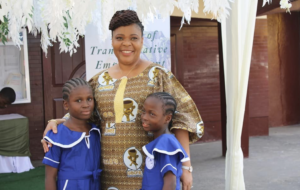Nobel Peace Laureate and activist bringing message of peace to Medgar Evers College

By David Gil de Rubio | dgilderubio@mec.cuny.edu
For Leymah Roberta Gbowee, the current global atmosphere of conflict and divisiveness are socio-political climates she’s well familiar with. Hailing from Liberia, Gbowee helped bring an end to her country’s 14-year civil war in 2003, a feat she was recognized for by being named a 2011 Nobel Peace Prize Laureate alongside fellow Liberian Elle Johnson Sirleaf and Yemeni journalist/civil rights activist Tawakkul Karman.
When Gbowee comes to Medgar Evers College on March 25 for a pair of Women’s History Month events, she’ll be expounding further on her work and the importance of how peace should be defined.
“Today, everyone speaks the language of peace, but what our times are calling for is a redefinition of peace,” she said. “It’s not just the ending of war, but focusing on giving dignity to people.
“During Women’s History Month, everyone should be included in our quest for equality, in our quest of providing, our sense of collective humanity and our quest for dignity. Women should be an equal part of the conversation, implementation and just about everything that has to do with creating a world order that gives hope and dignity to everyone.”
As a trained social worker and women’s rights activist, Gbowee has put in the work. Not only is she the founder and current president of the Gbowee Peace Foundation Africa (GPFA), but currently serves as the executive director of Gender, Law and Transformative Peace Initiative of the City of New York (CUNY) School of Law.
All of this was honed in the experiences of surviving a bloody conflict that not only eradicated 10 percent of Liberia’s population over the span of nearly a decade and a half, “…but had people who had husbands fighting on one side and sons who were fighting on the other side.”
It was an untenable situation Gbowee and the Women in Peacebuilding Program (WIPNET) knew had to end.
“A group of women came together and decided enough was enough,” Gbowee recalled. “Even the soldiers had seen so much bloodshed, they too were exhausted. All they were looking for was a group to stand up and say that it didn’t matter where you came from or who you were with. What mattered was that this nonsense would come to an end. We did not see religious differences. We did not see political/ideological differences. What was seen was a nation that needed to come back to sense and sensibility. That struggle lasted for a long time.”

As someone who endured virtual homelessness and an abusive relationship, the then-mother of five used her experiences in trauma healing former child-soldiers to help focus on women and efforts to build peace out of her country’s conflict. Gbowee and her delegation of Liberian women held demonstrations demanding quicker resolutions outside of the hotels where negotiations were being held. A major component of this women’s movement was leaning into faith, prayer and healing. It’s a pillar of what defines Gbowee’s day-to-day.
“With this movement, I was the leader that didn’t want to be a leader,” she explained. “I was the leader that wasn’t interested in working with women. But it was something I stumbled onto.
“When we started the movement, it was basically to see how women can work together. Two years into it, it became me having a dream of putting women together and praying for peace. Several months later, it became a big movement and eventually it contributed to ending the war. And that’s the essence of everything that I do. Prayer is a core part of my existence.”
When Gbowee sits down in conversation with moderator Lurie Daniel Favors (who is also the executive director of the Center for Social Law and Justice) on March 25 at Medgar Evers College, it is with the hope that attendees will take the time to slow down and incorporate certain truisms into their everyday lives.
“We currently live in a time where young people are part of a microwave generation—they want everything fast and quick,” Gbowee said. “I would tell people to stay on course and don’t rush for things to happen too fast. Also, don’t try to be anyone else, especially in a social media generation where everyone is looking for likes and different things.
“Also, we should not be anxious for trends. Different things trend but if you notice, trends never last because something else happens in an hour and that brings the trend down. Young people should not aim for trends, but they should rather aim for leaving lasting legacies. Because those processes that lead to legacies never really trend in the moment that they are being executed.”

